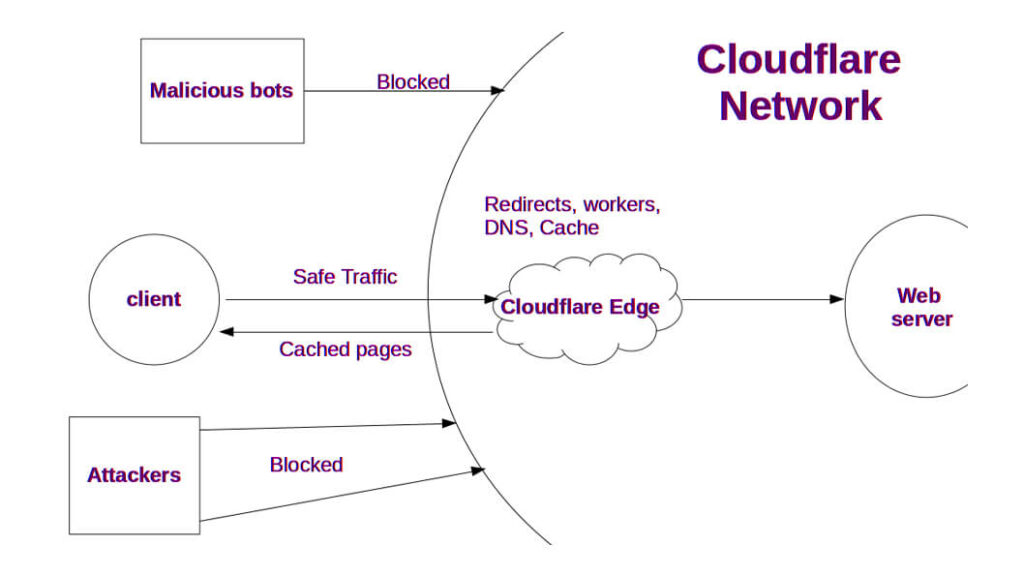Cloudflare is a cloud security platform and content delivery network (CDN) that offers website optimization, security, and performance services. It functions as a bridge between a website’s server and its visitors, increasing the website’s speed and reliability while also protecting it from online attacks.
Websites and web applications are becoming more prevalent these days. For many tasks, we have a website (or) a web application to complete. The majority of these websites and online apps are designed to be secure and private, but many small enterprises and non-tech people are limited access to their security rules. Cloudflare contributes to the security and performance of these websites. Cloudflare is a provider of Internet infrastructure whose goal is to improve the security, performance, and reliability of anything linked to the Internet. Cloudflare offers the majority of its key capabilities for free and has a straightforward installation and setup process. Cloudflare provides both a user interface and an API for administering your website. Cloudflare operates on a Freemium model, but most of its essential capabilities are available for free with some restrictions.
Free features of Cloudflare are as follows:
- DNS hosting: DNS is in responsible for converting domain names into IP addresses. Cloudflare provides DNS hosting to manage DNS records, and Cloudflare records take effect quickly in most circumstances.
- CDN: A Content Delivery Network (CDN) is a service that caches your website and serves it from the nearest server, increasing the website’s loading speed.
- SSL/TLS: Cloudflare offers free SSL for domain names and wildcard subdomains for the third level of the hostname.
- Firewall: Limited to 5 rules, Cloudflare firewall allows you to block traffic based on IP address, hostname, known bots, URI, and other criteria.
- Page rules: Limited to 3 rules, Pages rules enable a variety of tasks like as redirection, HTTPS rewrites, and more.
- Apps: Cloudflare apps, created by developers, provide various functionalities with the push of a button.
- Analytics: Cloudflare analytics give simple website analytics.
- Registrar: Cloudflare offers wholesale price for domain registration with free Whois redaction.
How Cloudflare works?
Many site providers offer direct Cloudflare integration via their web hosting Cpanel, but you may also join up directly at cloudflare.com. Click Add Site, then follow the instructions to change your domain’s name servers. That’s it, you’re now utilizing Cloudflare. Technically, Cloudflare functions as a reverse proxy, which means that all traffic is routed through Cloudflare servers located in over 200 cities globally.
Cloudflare is the first service to combine security with speed. Cloudflare servers, known as “Edge” servers by the company, cache the contents of the webpage and serve as a CDN. Because traffic must pass through the Edge server before reaching the original web server, Cloudflare can block malicious bots, protect against DDoS, and block traffic based on firewall rules.

How to use Cloudflare?
Website owners must sign up for an account and add their website to the Cloudflare dashboard in order to use Cloudflare. Cloudflare will automatically scan the website for DNS records and configure its CDN and security capabilities. Once configured, website owners can use the dashboard to monitor and alter Cloudflare settings.
Why use Cloudflare?
Cloudflare may assist website owners in improving the speed, dependability, and security of their websites, making it a vital tool for both corporations and individuals. Furthermore, Cloudflare’s services are inexpensive and simple to use, making them accessible to website owners with varying degrees of technical knowledge.
Advantages of Cloudflare
The fundamental benefit of Cloudflare is that it provides free security and performance on a wider scale. A few other benefits are:
- Cloudflare offers a free plan that includes the majority of its essential services.
- It functions like a CDN, increasing the load speed of websites.
- Cloudflare defends against malicious bots and DDoS attacks.
- It provided Managed DNS with short TTL.
- It offers a free SSL certificate that is totally managed by Cloudflare and is updated annually.
- Cloudflare offers forwarding rules as well as serverless functions.
- Cloudflare offers a variety of separate addons for various services.
- Cloudflare offers domain registration services.
- Provides an API for managing the majority of the services.
Disadvantages of Cloudflare
The main problem of Cloudflare is single-point failure, which means that if Cloudflare goes down, your website and sometimes email also fall down. A few other downsides are:
- The free plan has several limitations, and paid subscriptions are not cheap.
- DNS zones are managed, which may be inconvenient for some users.
- Custom Name servers are not available in the free plan.
- Only SSL certificates will be accepted if Cloudflare is active on the domain.
- SSL certificates are issued to sni.cloudflaressl.com with your domain in the SAN field and are only one level deep.
- The Free plan has relatively few page rules and Worker sites.
Most of the disadvantages will not be an issue for non-tech people or small firms, which is preferable. Finally, We recommend Cloudflare for small enterprises, non-tech people, small sites, personal websites, and add-ons if you wish to upgrade.

